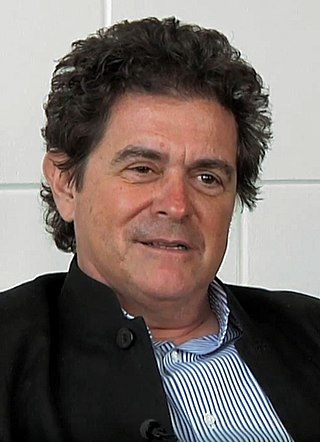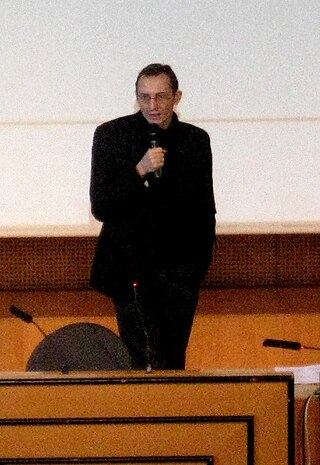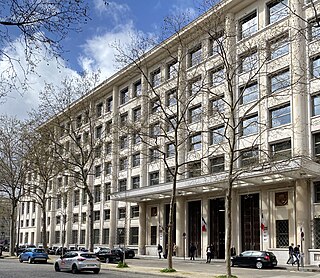In economics, a free market is an economic system in which the prices of goods and services are determined by supply and demand expressed by sellers and buyers. Such markets, as modeled, operate without the intervention of government or any other external authority. Proponents of the free market as a normative ideal contrast it with a regulated market, in which a government intervenes in supply and demand by means of various methods such as taxes or regulations. In an idealized free market economy, prices for goods and services are set solely by the bids and offers of the participants.

ENSAE Paris is a university in France, known as Grandes Ecoles and a member of IP Paris. ENSAE Paris is known as the specialization school of École polytechnique for economics, finance, applied mathematics, statistics, and data science. It is one of France's top engineering schools and is directly attached to France's Institut national de la statistique et des études économiques (INSEE) and the French Ministry of Economy and Finance.

James Bradford "Brad" DeLong is an American economic historian who has been a professor of economics at the University of California, Berkeley since 1993.

Bruno S. Frey is a Swiss economist and visiting professor for Political Economy at the University of Basel. Frey's research topics include Political economy and Happiness economics, with his published work including concepts derived from Psychology, Sociology, Jurisprudence, History, Arts, and Theology.

Andrei Shleifer is a Russian-American economist and Professor of Economics at Harvard University, where he has taught since 1991. Shleifer was awarded the biennial John Bates Clark Medal in 1999 for his seminal works in three fields: corporate finance, the economics of financial markets, and the economics of transition.
Regulatory economics is the application of law by government or regulatory agencies for various economics-related purposes, including remedying market failure, protecting the environment and economic management.
In the history of economic thought, a school of economic thought is a group of economic thinkers who share or shared a mutual perspective on the way economies function. While economists do not always fit within particular schools, particularly in the modern era, classifying economists into schools of thought is common. Economic thought may be roughly divided into three phases: premodern, early modern and modern. Systematic economic theory has been developed primarily since the beginning of what is termed the modern era.

Alberto Francesco Alesina was an Italian economist who was the Nathaniel Ropes Professor of Political Economy at Harvard University from 2003 until his death in 2020. He was known principally as an economist of politics and culture, and was famed for his usage of economic tools to study social and political issues. He was described as having “almost single-handedly” established the modern field of political economy, and as a likely contender for the Nobel Memorial Prize in Economic Sciences.
Employment protection legislation (EPL) includes all types of employment protection measures, whether grounded primarily in legislation, court rulings, collectively bargained conditions of employment, or customary practice. The term is common among circles of economists. Employment protection refers both to regulations concerning hiring and firing.

Étienne Wasmer is a French professor and economist currently holding a Professorship at New York University in Abu Dhabi. Wasmer mainly focuses on the fields of labor economics, job search theory, discrimination and human capital. He teaches microeconomics and labor economics.
Alan Manning is a British economist and professor of economics at the London School of Economics.
Thomas Philippon is a French economist and professor of finance at the New York University Stern School of Business.

Wim Driehuis is a Dutch economist, Emeritus Professor Economics and Business at the University of Amsterdam.
Christian Dustmann, FBA, is a German economist who currently serves as Professor of Economics at the Department of Economics of University College London. There, he also works as Director of the Centre for Research and Analysis of Migration (CReAM), which he helped found. Dustmann belongs to the world's foremost labour economists and migration scholars.

Pierre Cahuc is a French economist who currently works as Professor of Economics at Sciences Po. He is Program Director for the IZA Institute of Labor Economics's programme "Labour Markets" and research fellow at CEPR. His research focuses mainly on labour economics and its relationship with macroeconomics. In 2001, he was awarded the Prize of the Best Young Economist of France for his contributions to economic research. He belongs to the most highly cited economists in France and Europe's leading labour economists.
Stefanie Stantcheva is a Bulgarian-born French economist who has served as the Nathaniel Ropes Professor of Political Economy at Harvard University since 2021. She has been a member of the Conseil d’Analyse Économique since 2018. In 2018, she was described by The Economist as one of the best young economists of the decade.
Thierry Mayer is a French economist and Professor of Economics at Sciences Po. He belongs to the most frequently-cited economists in the field of international trade. In 2006, Mayer and Etienne Wasmer were awarded the Best Young Economist of France Award by Cercle des économistes and Le Monde.
Paola Giuliano is an economist and currently the Chauncey J. Medberry Chair in Management at the University of California, Los Angeles.

This is a list of books in the English language which deal with Germany and its geography, history, inhabitants, culture, biota, etc.

The Conseil d'Analyse Économique is an economic advisory body in Paris. It is government-funded and part of the Office of the French Prime Minister. It was established by executive order of 22 July 1997 under newly elected Prime Minister Lionel Jospin, and reorganized by order of 5 November 2012 to refocus its membership criteria on academic excellence.










